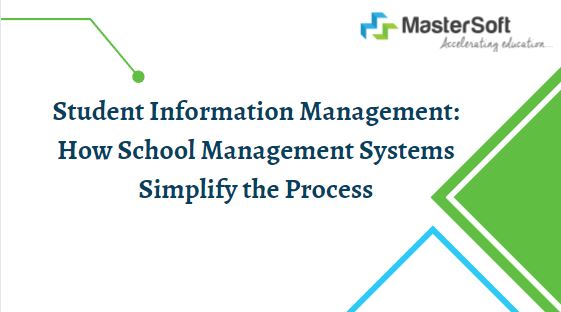Student information management is a critical aspect of educational institutions, whether it’s a small primary school or a large university. Keeping track of student data, academic records, attendance, and other essential information can be a daunting task if done manually. However, with the advent of technology, school management systems have become invaluable tools that simplify and streamline the entire process. In this blog post, we will explore the significance of school management systems in managing student information system and how they contribute to efficiency and effectiveness in educational institutions.
Centralized Data Repository
One of the most significant advantages of school management systems is their ability to create a centralized data repository for all student information. In the past, schools relied on paper records and spreadsheets, which could lead to data redundancy, errors, and loss. With a school management system, all student data, including personal information, academic records, attendance, and even extracurricular activities, can be stored securely in a centralized database. This not only ensures data accuracy but also makes it easy to access and update information when needed.
Streamlined Admission Process
The admission process can be a complex and time-consuming task for both students and administrative staff. School management systems simplify this process by providing online admission forms and automated workflows. Prospective students and their parents can fill out applications online, upload necessary documents, and pay fees electronically. This reduces paperwork, eliminates long queues, and ensures that all required information is collected and stored accurately.
Efficient Attendance Management
Tracking student attendance manually is prone to errors and time-consuming. School management systems offer automated attendance tracking features that record student attendance with precision. Teachers can easily mark attendance using a mobile app or web portal, and the system generates real-time reports. This not only saves time but also allows schools to identify and address attendance issues promptly.
Academic Progress Monitoring
School management systems play a crucial role in monitoring students’ academic progress. Teachers can input grades, assignments, and exam results into the system, which then generates progress reports and report cards. Parents can access these reports online, enabling them to stay informed about their child’s performance and any areas that may need improvement. This real-time communication fosters better parent-teacher collaboration.
Communication and Notifications
Effective communication between schools, teachers, parents, and students is vital. School management systems facilitate communication by providing features such as email notifications, SMS alerts, and messaging platforms. Schools can inform parents about important dates, events, and announcements instantly. Additionally, parents can reach out to teachers and administrators more conveniently, fostering a stronger parent-school partnership.
Financial Management
Managing school finances, including fee collection, budgeting, and expenditure tracking, is made easier with school management systems. These systems allow for online fee payments, generating financial reports, and maintaining transparency in financial transactions. Schools can track their income and expenses efficiently, ensuring financial stability.
Enhanced Security
Data security is a top priority in educational institutions, especially when handling sensitive student information. School management systems come with robust security features, including role-based access control, data encryption, and regular backups. These measures protect student data from unauthorized access and potential breaches, ensuring compliance with data protection regulations.
Conclusion
In today’s digital age, school management systems have revolutionized student information management in educational institutions. They provide a seamless and efficient way to store, manage, and access student data while enhancing communication between schools, parents, and students. By automating various administrative processes, these systems free up valuable time for educators and staff, allowing them to focus on what truly matters—providing quality education and fostering the growth of the next generation. As technology continues to advance, school management systems will undoubtedly play an even more significant role in the education sector, simplifying processes and improving the overall educational experience.

